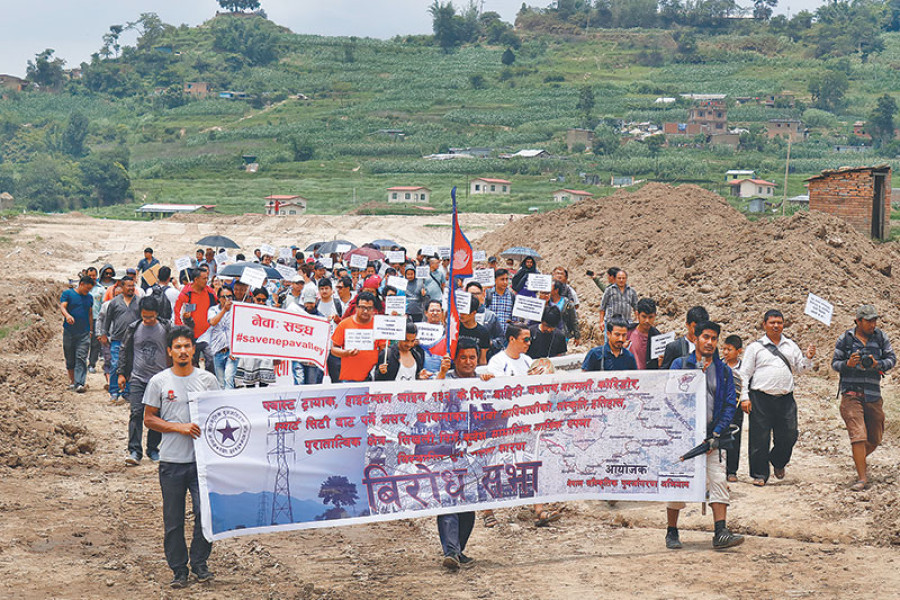Valley
After Khokana, Bungamati protests expressway works
The Kathmandu-Tarai Expressway has got into a fresh controversy with the residents of Pharsidol, a traditional Newari settlement in Bungmati, Lalitpur, protesting against the government’s plan to build the ambitious project through their fertile farmland.
Chandan Kumar Mandal
The Kathmandu-Tarai Expressway has got into a fresh controversy with the residents of Pharsidol, a traditional Newari settlement in Bungmati, Lalitpur, protesting against the government’s plan to build the ambitious project through their fertile farmland.
Bungamati Locals have accused the government of encroaching upon their arable land without consent and not paying enough compensation for acquiring their land.
On Saturday afternoon, dissatisfied locals protested on the project site, where work began nearly a month ago. In the rally, participants chanted slogans against the government and the Nepal Army, which has been charged with the construction, and planted paddy at the project site.
Anil Tuladhar, a local of Pharsidol, said the NA has started construction without informing the locals whose land came in course of the project. “Our arable land is taken from us without prior information. Construction has begun while many farmers have refused to take the compensation amount, which they say is too little,” he said.
According to locals, construction at Dadhighat along the Bagmati riverbanks began nearly a month ago. While most of the marked farmland has been flattened at Pharsidol, some patches in the middle of the worked ground remain untouched.
Shyam Krishna Maharjan, a local, said paddy plantations in the midst of the flattened land belong to farmers who have yet to be compensated. “Locals do not have a long list of demands. We just want suitable sums for our land that goes into the project,” he said.
Residents of Khokana, another traditional Newari settlement in Southern Lalitpur, had been protesting against the expressway. According to them, the ambitious project would threaten their religious heritage, livelihood and indigenous identity. Khokana locals are also not satisfied with the compensation amount offered to them.
Conservationists argue that the 76.2 km track would threaten heritage sites at Pharsidol too. The fast track would pass via the site where the Khadga Jatra is celebrated and the famous Machhindranath Jatra begins, according to Ashoj Kumar Maharjan, a culture conservationist and central member of the Nepal Sanskritik Punarjaagaran Abhiyan.
“The jatra begins here before it reaches Patan. The expressway will pass through the area which serves as the ground for various festivals. If the Machhindranath Jatra does not start here, how will people celebrate it in Patan? Only pulling the chariot won’t be enough,” said Ashoj, adding that the 8-km stretch from Pharsidol to Khokana will not only snatch land away from farmers at nominal rates but also attack various heritage sites.
Locals have also charged the Army with starting the project without preparing the detailed project report (DPR) first.
The NA, refusing to buy the DPR prepared by an Indian consultant, has shortlisted six firms recently for conducting the DPR.
“There is no DPR and no environmental impact assessment, but the construction is going on with heavy deployment of security personnel. The government cannot take people’s land without proper compensation but they have done it here. In the name of development, the government cannot rob poor farmers of their land,” said Suraj Maharjan, a Save Nepa Valley campaigner.




 20.12°C Kathmandu
20.12°C Kathmandu













